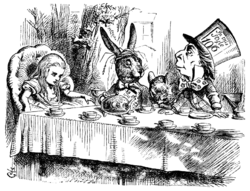Mad as a March hare
The phrase is an allusion that can be used to refer to any other animal or human who behaves in the excitable and unpredictable manner of a March hare.
[2] A long-held view is that the hare will behave strangely and excitedly throughout its breeding season, which, in Europe, peaks in the month of March.
[3] An early verbal record of this animal's strange behaviour occurred in about 1500, in the poem Blowbol's Test[4] where the original poet said: Similar phrases are attested in the sixteenth century in the works of John Skelton (Replycacion, 1528: "Aiii, I saye, thou madde Marche Hare"; Magnyfycence, 1529: "As mery as a marche hare").
A later recorded use of the phrase occurs in the writings of Sir Thomas More (The supplycacyon of soulys made by syr Thomas More knyght councellour to our souerayn lorde the Kynge and chauncellour of hys Duchy of Lancaster.
"[3] Although the phrase in general has been in continuous use since the 16th century,[3] it was popularised in more recent times by Lewis Carroll in his 1865 children's book Alice's Adventures in Wonderland, in which the March Hare is a character.

